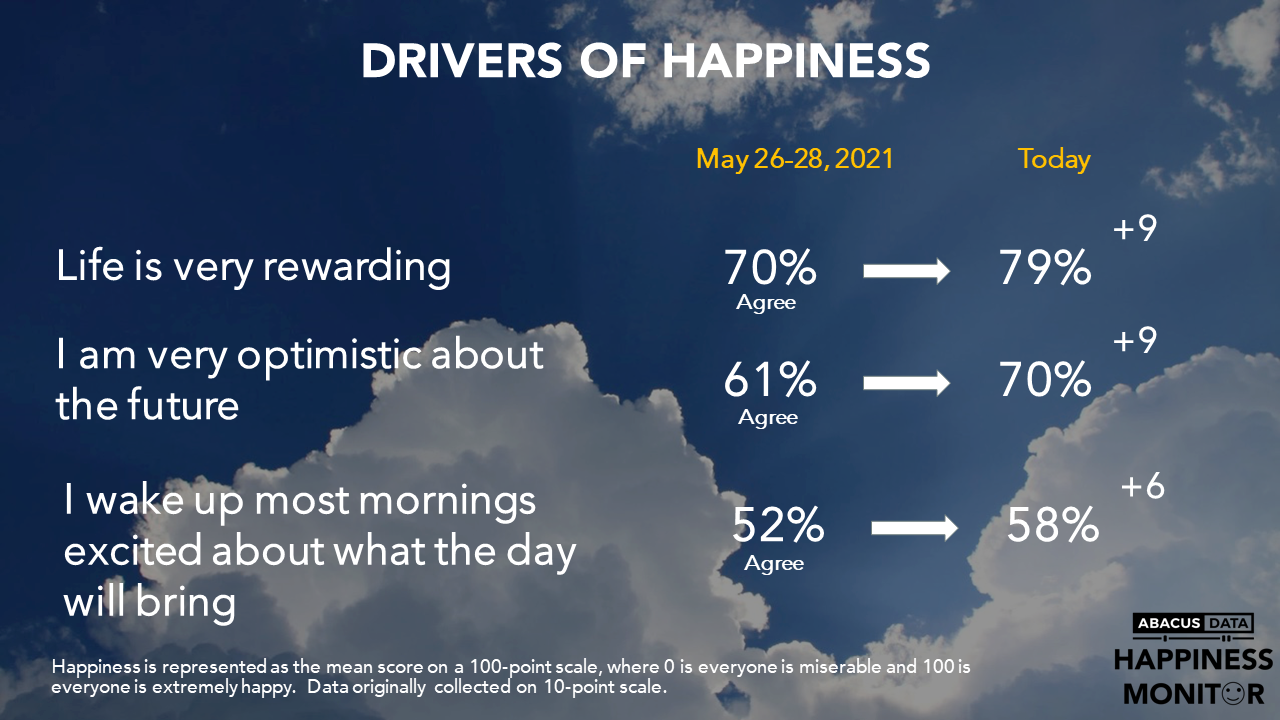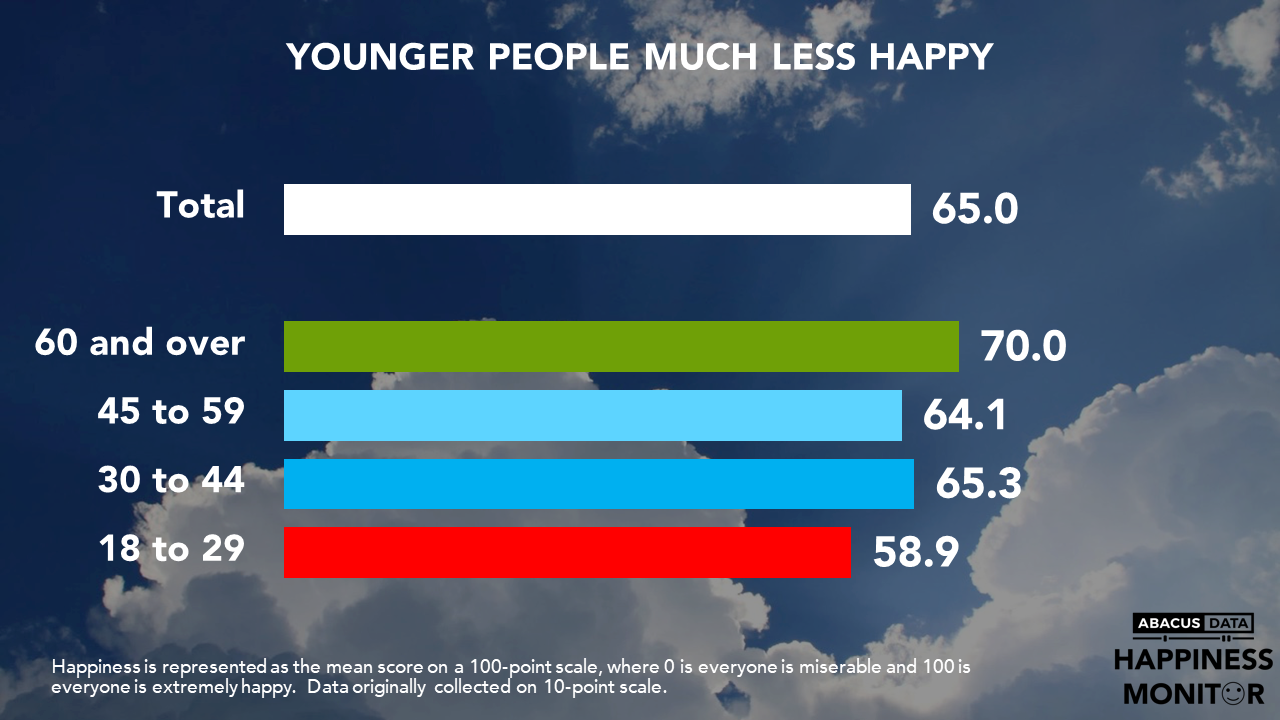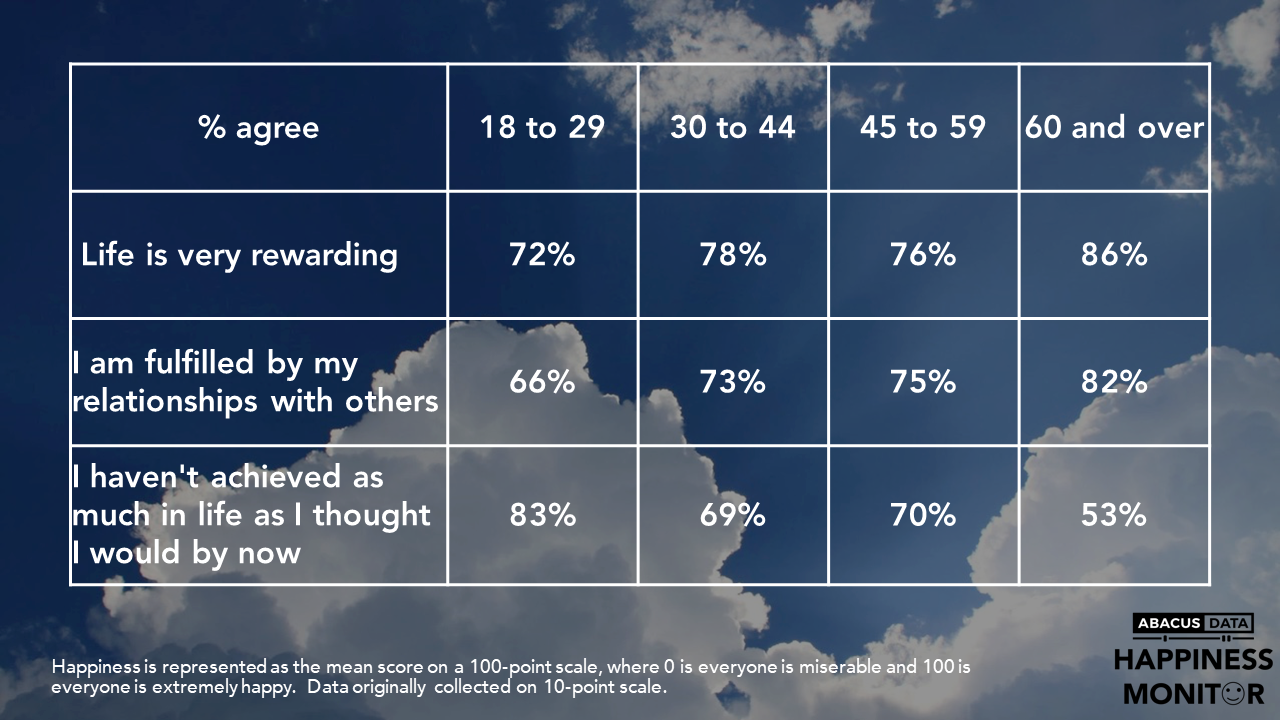More Happiness Evident but Young People Remain Unhappy
July 29, 2021
It feels like a happier place. As restrictions have loosened and more and more people are seeing family and friends the word on the street feels more positive. Certainly, Canadians this spring are as happy as they have been since the Happiness Monitor was launched in October. But our brighter outlook is not a state of euphoria. One group that continues to be less happy are young people (under 30).
As of July 19th, the average happiness score is 65.0 out of 100. While happiness has risen and fallen since May, our overall happiness is consistently higher than it was last fall and winter. Quebec (69) and Atlantic Canada (68) are the happiest places.

Compared to the end of May when happiness dropped significantly to 62, Canadians are more hopeful, have a sense of personal fulfillment and are more likely to start the day with a sense of excitement.

[sc name=”signup”]
One of the consistent drivers of happiness is age. Younger people, those 18 to 29, are consistently less happy than their older peers. The difference between 18 to 29 year old Canadians and those over 60 is 11.1 points. As we tend to think of optimism and youth going together, this has always been a striking finding. However, looking at what drives happiness and the recent impacts of the pandemic on future opportunities for young Canadians, the lower levels of happiness among this group might not be as surprising.
Of course, not all of the 18 to 29 year old cohort is unhappy. Some of the cohort are decidedly happy and this reveals some insight into the drivers of unhappiness for these Canadians. Those who are employed in a permanent full-time position are very happy (68.8). In fact, this is almost same level of happiness for the average Canadian with full-time work.

Another way to look at this is in terms of key attitudes that are strongly tied to happiness. The 18 to 29 year old cohort differs from the older cohorts on three key questions. While 86% of those over 60 years agree that life is rewarding, only 72% of those under 30 feel this way. Similarly, those under 30 are much less likely to feel fulfilled by their relationship with others and much more likely to think they have not achieved what they thought they would by now.

THE UPSHOT
According to Richard Jenkins: The pandemic’s impact has been unevenly distributed and this is certainly reflected in the relative unhappiness of younger Canadians. While it is tempting to think of this malaise as generational, it is noteworthy that when we look at employed full-time members of this generation, they look a lot like their older peers. The more likely explanation is that the pandemic has left many of those under 30 with the feeling of being left behind or left out of life.
Time will tell if happiness improves among the under 30 crowd as things return to normal. In the meantime we need to be aware of the potential political fallout of a generation that is not feeling as positive as other Canadians.
According to Oksana Kishchuk: The lack of rebound in happiness among the younger generations is likely due to the uneven impacts of the pandemic on things that matter to long-term success or happiness. Certainly everyone has had a shift in their daily lives this past year, but older Canadians just had a better chance at having a security blanket (higher levels of home ownership, further on in their careers, bigger savings pools, etc.) to weather it. For younger Canadians, not so much. As an example, the unpredictable and hotter than ever housing market impacting the dream of home ownership, something young people say is one of their life goals. Or the devastating job loss among younger generations during the pandemic, and the impact a rocky start in a career will have on long-term career projections, and financial stability. On these issues in particular, young people aren’t yet seeing the same kind of rebound, and it’s likely their happiness won’t start on an upward trajectory until they do.
And don’t miss any of our research and analysis, plus get our weekly Worth A Look newsletter. Sign up today.
METHODOLOGY
Our survey was conducted online with 1,500 Canadians aged 18 and over from July 14 to 19, 2021. A random sample of panellists was invited to complete the survey from a set of partner panels based on the Lucid exchange platform. These partners are double opt-in survey panels, blended to manage out potential skews in the data from a single source.
The margin of error for a comparable probability-based random sample of the same size is +/- 2.5%, 19 times out of 20. In Canada the data were weighted according to census data to ensure that the sample matched Canada’s population according to age, gender, educational attainment, and region.
This poll was conducted and paid for by Abacus Data.
ABOUT ABACUS DATA
We are the only research and strategy firm that helps organizations respond to the disruptive risks and opportunities in a world where demographics and technology are changing more quickly than ever.
Find out more about what we are doing to help clients respond to the COVID-19 pandemic.
We are an innovative, fast-growing public opinion and marketing research consultancy. We use the latest technology, sound science, and deep experience to generate top-flight research-based advice to our clients. We offer global research capacity with a strong focus on customer service, attention to detail and exceptional value.
We were one of the most accurate pollsters conducting research during the 2019 Canadian Election.

Contact us with any questions.
Find out more about how we can help your organization by downloading our corporate profile and service offering.



